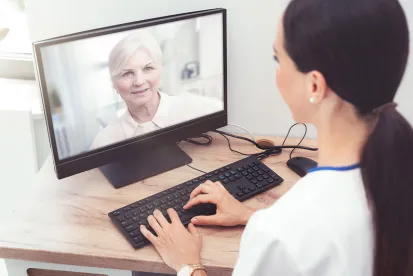Trending in Telehealth is a new series from the McDermott digital health team in which we highlight state legislative and regulatory developments that impact the healthcare providers, telehealth and digital health companies, pharmacists, and technology companies that deliver and facilitate the delivery of virtual care.
Trending in the past week:
-
Telehealth pilot programs
-
Mental health
A CLOSER LOOK
Finalized Legislation & Rulemaking
-
Connecticut enacted HB 6768, which permits physicians, advanced practice registered nurses and physician assistants to certify a qualifying patient’s use of medical marijuana and provide follow-up care using telehealth if they comply with other statutory certification and recordkeeping requirements.
-
Florida enacted HB 5101, which requires each school district to implement a school-based mental health assistance program that provides behavioral health services in-person and supplemented by telehealth.
-
Florida enacted SB 2500, which provides additional funding for telehealth services under the Minority Maternity Care program.
-
Illinois enacted SB 1298, amending the Home and Community-Based Services Waiver Program for Adults with Developmental Disabilities to permit medical and emergency telehealth services for persons with intellectual and developmental disabilities.
-
Louisiana enacted SB 186, adopting the Occupational Therapy Licensure Compact.
-
Louisiana enacted SB 66, which amends the state insurance code by replacing the term “telemedicine” with “telehealth,” for consistency throughout the code. The amendment does not require a provider to have an in-person examination with the patient prior to using telehealth but does require that a referral be made to an in-state healthcare provider or in-state follow-up care be arranged if necessary. The amendment also permits the use of interactive audio without video if, after access and review of the patient’s medical records, the healthcare provider determines that the provider is able to meet the same standard of care as if the services were provided in-person.
-
Louisiana enacted HB 41, which requires health plans to provide equivalent coverage and payments for telehealth occupational therapy services as for in-person services, unless the plan and the provider agree otherwise.
-
Louisiana enacted HB 181, which allows coroners to use telehealth when conducting an examination for an emergency mental health commitment.
-
Texas enacted HB 2727, which amends the requirements for the home telemonitoring program under Medicaid, including reimbursement requirements.
-
Texas enacted HB 617, which establishes a pilot project to provide emergency medical services instruction and emergency prehospital care instruction through a telemedicine medical service or telehealth service provided by regional trauma resource centers to healthcare providers in rural trauma facilities and emergency medical services providers in rural areas.
-
Texas enacted SB 1146, increasing access to telehealth services for inmates. The law requires the Department of Criminal Justice, in conjunction with The University of Texas Medical Branch at Galveston and the Texas Tech University Health Sciences Center, to establish procedures to expand access to telemedicine medical services, telehealth services and onsite medical care for inmates, including onsite mobile care units that provide diagnostic imaging, physical therapy and other appropriate mobile health services.
Legislation & Rulemaking Activity in Proposal Phase
Highlights:
-
Maine progressed LD 757 in the second chamber to expand telemonitoring in the MaineCare program. The rules would allow a provider to offer telemonitoring services if medically necessary given the patient’s health status, and would allow providers to determine the frequency of telemonitoring services to achieve care plan goals for the patient.
-
Rhode Island progressed SB 965 in the second chamber. The bill would amend the Telemedicine Coverage Act and define a patient-provider relationship as a relationship where the healthcare professional agrees to undertake diagnosis and treatment of the patient and the patient agrees to be treated.
-
Rhode Island progressed HB 6489 in the second chamber to establish telepractice standards for audiology and speech language therapy and pathology professionals.
Why it matters:
-
States continue to progress and pass legislation establishing telehealth pilot programs across multiple departments. As noted in past posts, pilot programs are important steps to determine the best uses of telehealth and increase access to healthcare in vulnerable populations.
-
States continue to progress and pass legislation expanding the use of telehealth and telemedicine for mental health.





 />i
/>i

